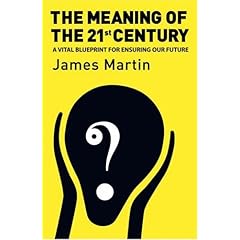The canyon and the singularity
 I've been reading the Meaning of the 21st Century by James Martin. Being a 'realistic' future vision, it discusses and explains many of the old familiars:- soil erosion, world population growth, climate change, genetic engineering and nanotechnology. This will be news if you've never read a 'futures' book before, don't remember school geography and/or would be too embarrassed to loiter in the science fiction section of Borders.
I've been reading the Meaning of the 21st Century by James Martin. Being a 'realistic' future vision, it discusses and explains many of the old familiars:- soil erosion, world population growth, climate change, genetic engineering and nanotechnology. This will be news if you've never read a 'futures' book before, don't remember school geography and/or would be too embarrassed to loiter in the science fiction section of Borders.If you have, then I'd recommend this book anyway. Why?
First, it was the first time I'd read about fourth generation 'pebble bed' nuclear reactors. These have the potential to be small, mass-produced and automatically shutdown before they lose containment. In theory, they address some of the concerns about nuclear energy raised by David Howarth MP during a talk I attended late last year in Cambridge. He was concerned that large nuclear reactors would force the UK's electricity to continue to be provided by a centralised grid, excluding microgeneration from the energy mix and incurring maybe a 20% energy loss during transportation between the power station and user. In addition, large conventional reactors tend to have a place-specific design that imposes a high 'first-build' cost. Mass producing small pebble beds would avoid these problems.
Second, his overarching thesis is relatively original even if the individual technologies are not. He claims that today's teenagers, the 'Transition Generation', will have to successfully pass through a 'canyon' of rising environmental problems. If humanity fails to pass through the 'canyon' and create a sustainable society, we will return to a dark age. If we succeed, we will hit the 'singularity', a concept familiar to anyone who has read 'Singularity Sky' or 'Iron Sunrise' by Charles Stross. James Martin (and Charles Stross) identify a macrotrend of accelerating increases in computer power where computer power is a proxy for the ability to manipulate 'bits' of information, non-biological or biological. The 'singularity' is the area on the technological growth curve at which the gradient of the trend line tends to infinity (illustration included for the non-mathmos amongst you). The singularity would be driven by self-evolving computers and other technologies that would develop without direct human input. James Martin's contribution seems to be fleshing out the moments before the singularity; he stops just beyond the canyon. Charles Stross and other science fiction writers imagine the possibilities of a society someway beyond the singularity.
Labels: book reviews, climate change, futurology

3 Comments:
At 6:12 am , Femme de Resistance said...
Femme de Resistance said...
Thanks for this - been meaning to discuss "Green Romanticism" for a while.
At 8:29 pm , James said...
James said...
Don't you think it's rather interesting (and amusing) that futurology simply exists by taking current fashionable beliefs/trends and then running them to logical if 'slightly' exaggerated conclusions? If you don't believe me, then take a look at all those 'Dan Dare' comics and other more serious articles from the 1950s and 60s which had us all living on the moon in plstic shrink wrap by about AD 2000 ;-)
The ironic upshot of all of this is that 'futurology' is actually a highly accurate barometer of our current circumstances. Perhaps it should be called 'presentology'.
At 10:07 pm , Anonymous said...
Anonymous said...
This is a "Good News / Bad News" comment.
The "Good News" is that I approve of your change from the stygian gloom of a black background which made your occasionally long-winded posts too tiring on the eyes to read to their usual wrong conclusions.
The "Bad News" is that now I will make a point of visiting more often!
As to your commenter above who writes "Subject : A thinking mind cannot feel", allow me to inform him that were he to close his eyes and think as hard as possible he would definitely feel it if I came up and kicked him in the you-know-whats! Also, his fellow Indian, the late and eccentric, Mr. Mahatma Ghandi, might have been satisfied to drink his own urine but frankly I prefer a good single malt and if that takes a factory to produce it, then so be it.
As to your good and delectable self, I would pack in the non-science fiction, if I were you, and stick to the problems we have today rather than the fantasies of tomorrow.
Post a Comment
Subscribe to Post Comments [Atom]
<< Home